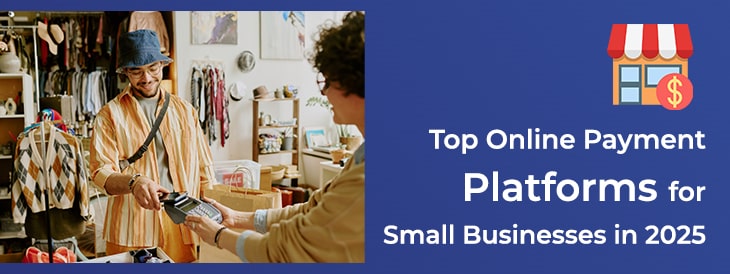Top Online Payment Platforms for Small Businesses in 2025
Top Online Payment Platforms for Small Businesses in 2025

Introduction to Online Payment Platforms
In the dynamic business environment of 2025, online payment platforms play an essential role for small businesses. These platforms are not merely transaction processors; they provide the infrastructure that enables businesses to thrive in the digital marketplace. From expanding customer reach to optimizing operational workflows, they are integral to modern commerce.
The surge in e-commerce has amplified the need for reliable and efficient payment solutions. Businesses now require platforms that can handle diverse payment methods, offer robust security features, and integrate seamlessly with various business tools. This demand has led to significant advancements in payment technology, making it crucial for small businesses to stay updated on the best options available.
Furthermore, the digital economy has increased the expectation for speed and convenience in transactions. Customers now anticipate quick and hassle-free payment processes, and businesses must meet these expectations to maintain competitiveness. Payment platforms that deliver an excellent user experience can significantly impact customer satisfaction and retention.
Small businesses also benefit from the analytical tools provided by these platforms. Detailed insights into transaction data can help businesses make informed decisions, identify trends, and optimize their financial strategies. The ability to access and analyze this data in real time provides a competitive edge in a rapidly changing market.
Lastly, as globalization continues to shape the business landscape, the need for handling international transactions efficiently becomes more pressing. Platforms that support multiple currencies and offer low transaction fees are increasingly valuable for businesses looking to expand their reach beyond local markets.
Understanding the capabilities and features of the top online payment platforms is essential for small businesses aiming to leverage digital transactions for growth and sustainability in 2025.
Some Related Blogs
- High-Risk Payment Gateways vs. Traditional Payment Gateways: Key Differences
- The Future of High-Risk E-commerce Payment Gateways: Trends to Watch
- What Makes an E-commerce Business High-Risk and How to Find a Payment Gateway for It
- How High-Risk E-commerce Payment Gateways Can Impact Your Bottom Line
Criteria for Choosing a Payment Platform
When selecting an online payment platform, small businesses must evaluate several crucial criteria to ensure they are making the right choice for their needs.
Security and compliance features are paramount. It is vital to choose platforms that offer robust security measures, such as encryption and two-factor authentication, along with compliance with standards like PCI DSS. These features protect both the business and its customers, fostering trust and reliability.
Ease of integration and user experience are also significant considerations. A platform that integrates seamlessly with existing systems—such as e-commerce websites, accounting software, and CRM tools—reduces operational headaches and improves efficiency. Additionally, an intuitive user interface can simplify the payment process for both the business and its customers, enhancing overall user satisfaction.
Another key factor is the variety of payment methods supported. Businesses should opt for platforms that accept multiple forms of payment, including credit cards, digital wallets, and bank transfers. This flexibility accommodates diverse customer preferences and can increase sales opportunities.
Cost structure is another critical aspect to consider. It’s essential to understand the platform’s fees, including transaction fees, monthly charges, and any additional costs for premium features. A transparent and competitive pricing model can help businesses manage their expenses more effectively.
Customer support and service reliability are equally important. A platform with responsive customer support can address issues quickly, minimizing downtime and potential revenue loss. Look for providers that offer multiple support channels, such as live chat, email, and phone support.
Lastly, the ability to scale with your business is crucial. As your business grows, your payment platform should be able to accommodate increased transaction volumes and offer features that support expansion, such as multi-currency capabilities and global payment options.
Popular Payment Platforms in 2025
As of 2025, several online payment platforms stand out for small businesses due to their comprehensive offerings and reliability. PayPal, Stripe, and Square are among the most prominent, each bringing unique strengths to the table.
PayPal remains a popular choice due to its global reach and established reputation. It offers competitive fees and a wide range of services, including invoicing and recurring billing. PayPal’s scalability makes it suitable for both small and larger businesses looking to expand internationally.
Stripe is renowned for its developer-friendly interface and customizable features. It provides extensive API support, allowing businesses to tailor the payment process to their specific needs. Stripe also offers competitive pricing and a strong focus on security, making it a preferred choice for tech-savvy entrepreneurs.
Square is well-known for its ease of use and hardware integration options, such as point-of-sale systems. It provides a suite of tools that help small businesses manage sales both online and offline. Square’s transparent fee structure and comprehensive analytics tools make it an attractive option for businesses seeking simplicity and functionality.
Comparing these platforms involves analyzing fees, features, and scalability. Each has its strengths, and the best choice often depends on a business’s specific needs and objectives.
Emerging Platforms to Consider
In 2025, new online payment platforms are gaining recognition for their innovative solutions tailored to the needs of small businesses. Revolut is a notable entrant with its multi-currency accounts and low transaction fees. This platform offers small businesses the ability to handle international payments seamlessly, making it a strong contender for those involved in cross-border commerce.
Another promising platform is Payoneer, which caters to freelancers and small businesses that operate on a global scale. Payoneer stands out with its cost-effective solutions, including direct bank transfers and global receiving accounts, simplifying the management of international payments.
Zelle, which has been widely used for personal transactions, is now making strides in the small business sector. Known for its instant payment capabilities, Zelle provides businesses with the advantage of fast transaction processing, which is crucial for maintaining efficient cash flow.
These emerging platforms offer unique features that set them apart from the established players, providing small businesses with more choices to find the best fit for their specific needs.>
![]()
Email us anytime!
Email customer service 24/7 at info@binarygateways.com
![]()
Call us anytime!
Reach customer care 24/7 at (801) 761-5001
